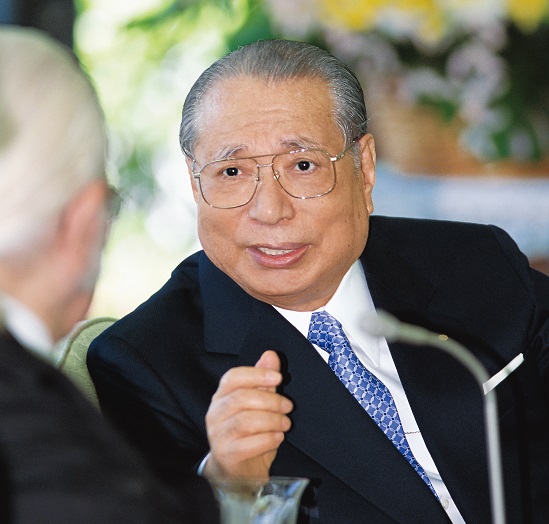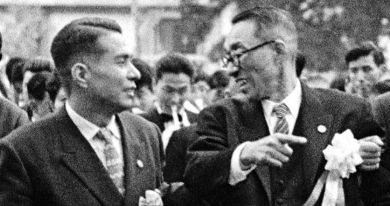
Daisaku Ikeda is a Buddhist philosopher, peacebuilder, educator, author and poet. He is the third president of the Soka Gakkai and the founding president of the Soka Gakkai International (SGI).
Ikeda was born in Tokyo, Japan, on January 2, 1928, the fifth of eight children, to a family of seaweed farmers. The devastation and senseless horror he witnessed as a teenager during World War II gave birth to a lifelong passion to work for peace, rooting out the fundamental causes of human conflict.
In 1947, at the age of 19, he met Josei Toda (1900–58), educator and leader of the Soka Gakkai. Ikeda found in Toda an open and unaffected person, a man of unshakable conviction with a gift for explaining profound Buddhist concepts in logical, accessible terms. He soon found employment at one of Toda’s companies and later completed his education under the tutelage of Toda, who became his mentor in life.
Soka Global Movement
In May 1960, two years after Toda’s death, Ikeda, then 32, succeeded him as president of the Soka Gakkai. Under his leadership, the movement began an era of innovation and expansion, becoming actively engaged in cultural and educational endeavors worldwide. Ikeda has dedicated himself to fulfilling Toda’s dreams by developing initiatives in the areas of peace, culture and education.
In 1975, Ikeda became the first president of the SGI.

Ikeda is founder of the Soka (value-creation) schools, a nondenominational school system based on an ideal of fostering each student’s unique creative potential and cultivating an ethic of peace, social contribution and global consciousness. The school system runs from kindergarten through graduate study and includes a university in Tokyo, Japan, and another in California, USA.
Ikeda is a staunch proponent of dialogue as the foundation of peace. Since the 1970s he has pursued dialogue with a wide range of individuals around the world in political, cultural, educational and academic fields. In furtherance of his vision of fostering dialogue and solidarity for peace, Ikeda has founded a number of independent, nonprofit research institutes that develop cross-cultural, interdisciplinary collaboration on diverse issues. The Min-On Concert Association and the Tokyo Fuji Art Museum promote mutual understanding and friendship between different national cultures through the arts.
The central tenet of Ikeda’s thought, and of Buddhism, is the fundamental sanctity of life, a value which Ikeda sees as the key to lasting peace and human happiness. In his view, global peace relies ultimately on a self-directed transformation within the life of the individual, rather than on societal or structural reforms alone. This idea is expressed most succinctly in a passage in his best-known work, The Human Revolution, Ikeda’s novelization of the Soka Gakkai’s history and ideals: “A great inner revolution in just a single individual will help achieve a change in the destiny of a nation and, further, will enable a change in the destiny of all humankind.”
Daisaku Ikeda, Honorary President of the Soka Gakkai and President of the Soka Gakkai International (SGI), passed away from natural causes at his residence in Shinjuku, Tokyo, on the evening of November 15, 2023. He was 95. A funeral has been held with members of his immediate family; the time and date of commemorative services will be announced shortly.
Ikeda was born in Tokyo on January 2, 1928. He was inaugurated as third President of the Soka Gakkai in 1960 and for almost two decades led the lay Buddhist movement in dynamic growth that also saw important international development. He became Soka Gakkai International (SGI) President in 1975 and Soka Gakkai Honorary President in 1979. He is survived by his wife Kaneko and his sons Hiromasa and Takahiro.
